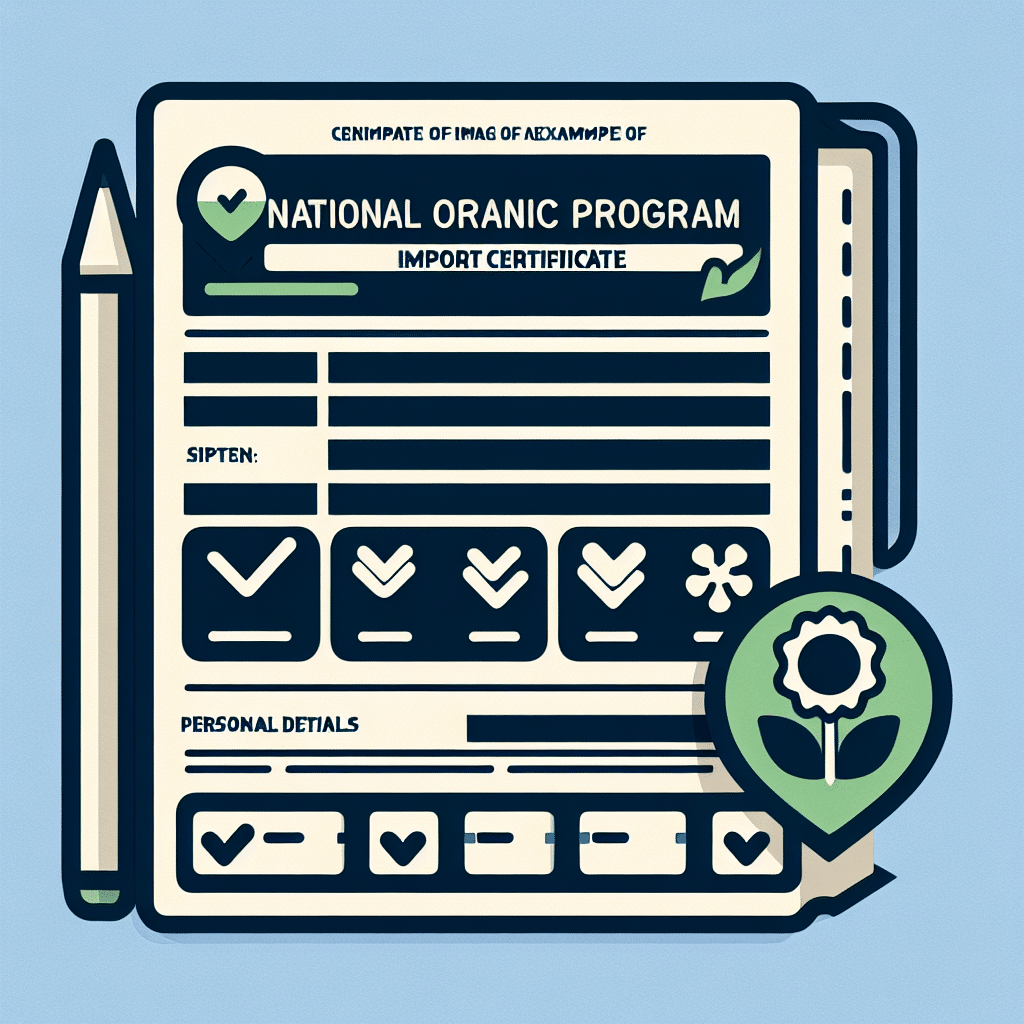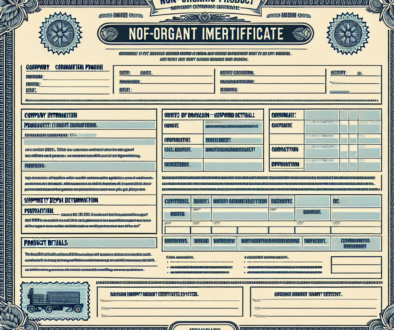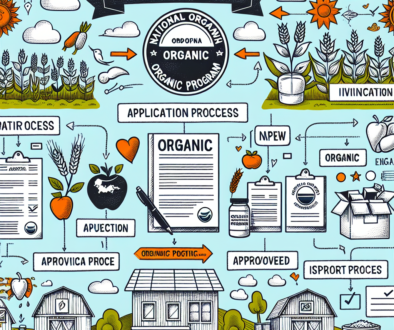Nop Import Certificate Example: Avoid Common Mistakes
-
Table of Contents
- Navigating Nop Import Certification: Avoid Common Mistakes
- Understanding the NOP Import Certificate
- Common Mistakes to Avoid
- Best Practices for a Successful NOP Import Certificate Application
- Case Studies and Examples
- Statistics to Consider
- Conclusion: Key Takeaways for a Smooth NOP Import Process
- Enhance Your Organic Product Line with ETprotein’s High-Quality Proteins
Navigating Nop Import Certification: Avoid Common Mistakes

When it comes to importing organic products into the United States, obtaining a National Organic Program (NOP) Import Certificate is a critical step. This certificate is a testament to the compliance of your products with the USDA organic regulations, which is essential for market access. However, the process of acquiring an NOP Import Certificate can be fraught with potential pitfalls. In this article, we will explore how to avoid common mistakes when applying for an NOP Import Certificate, ensuring a smoother import process for your organic goods.
Understanding the NOP Import Certificate
The NOP Import Certificate is a document required by the USDA to verify that organic products shipped to the U.S. comply with the USDA organic standards. This certificate must accompany any organic product that is imported into the United States, and it is the responsibility of the importer to ensure that all organic products have the appropriate certification.
Common Mistakes to Avoid
Securing an NOP Import Certificate involves a detailed process, and there are several common mistakes that importers should be aware of to avoid delays or rejections. Here are some key errors to steer clear of:
- Incorrect or Incomplete Information: One of the most common mistakes is submitting an application with incorrect or incomplete information. This can range from typos in the product name to missing details about the quantity or origin of the product.
- Lack of Proper Documentation: Failing to provide the necessary supporting documents, such as organic certificates from the country of origin, can result in the rejection of your application.
- Not Understanding Equivalency Arrangements: The U.S. has organic equivalency arrangements with certain countries. Not being aware of these arrangements or how they affect your import can lead to unnecessary complications.
- Timing Issues: Waiting until the last minute to apply for your NOP Import Certificate can lead to delays, especially during peak seasons when the USDA is processing a high volume of applications.
Best Practices for a Successful NOP Import Certificate Application
To ensure a successful NOP Import Certificate application, consider the following best practices:
- Double-Check All Information: Before submitting your application, review all the information for accuracy and completeness. This includes the product description, quantity, and producer details.
- Gather All Necessary Documentation: Make sure you have all the required documents on hand, including organic certificates and transaction certificates from the exporting country.
- Understand the Equivalency Arrangements: Familiarize yourself with the organic equivalency arrangements between the U.S. and other countries to ensure your products qualify.
- Plan Ahead: Start the application process well in advance of your intended import date to account for any unforeseen delays.
Case Studies and Examples
Let’s look at some real-world examples to illustrate the importance of avoiding these common mistakes:
- Case Study 1: An importer failed to double-check the product quantity on their NOP Import Certificate application, leading to a discrepancy with the shipment. This resulted in a delay at customs and additional costs to rectify the mistake.
- Case Study 2: An importer was unaware of the equivalency arrangement between the U.S. and the European Union. They submitted an application without the necessary EU organic certificate, causing their shipment to be held until the proper documentation was provided.
Statistics to Consider
According to the USDA, the number of organic importers is on the rise, with thousands of NOP Import Certificates issued annually. With the growing demand for organic products, it’s more important than ever to ensure that your application process is error-free. A study by the Organic Trade Association showed that the U.S. organic market grew by 6.3% in 2017, highlighting the potential for importers who can navigate the certification process successfully.
Conclusion: Key Takeaways for a Smooth NOP Import Process
In conclusion, obtaining an NOP Import Certificate is a vital step for any importer of organic products into the United States. By avoiding common mistakes such as providing incorrect information, lacking proper documentation, misunderstanding equivalency arrangements, and mismanaging timing, you can ensure a smoother import process. Remember to double-check all information, gather necessary documents, understand equivalency arrangements, and plan ahead to avoid any complications with your NOP Import Certificate application.
Enhance Your Organic Product Line with ETprotein’s High-Quality Proteins
If you’re looking to expand your organic product offerings, consider ETprotein’s range of high-quality protein products. Their selection includes organic rice protein, pea protein, and various seed proteins, all characterized by a neutral taste and non-GMO, allergen-free attributes. With L-(+)-Ergothioneine purity over 98%, ETprotein’s products cater to industries such as nutraceuticals, pharmaceuticals, cosmeceuticals, and food and beverage. By partnering with ETprotein, you can ensure that your organic products meet the highest standards of quality and sustainability.
About ETprotein:
ETprotein, a reputable protein and L-(+)-Ergothioneine (EGT) Chinese factory manufacturer and supplier, is renowned for producing, stocking, exporting, and delivering the highest quality organic bulk vegan proteins and L-(+)-Ergothioneine. They include Organic rice protein, clear rice protein, pea protein, clear pea protein, watermelon seed protein, pumpkin seed protein, sunflower seed protein, mung bean protein, peanut protein, and L-(+)-Ergothioneine EGT Pharmaceutical grade, L-(+)-Ergothioneine EGT food grade, L-(+)-Ergothioneine EGT cosmetic grade, L-(+)-Ergothioneine EGT reference grade and L-(+)-Ergothioneine EGT standard. Their offerings, characterized by a neutral taste, non-GMO, allergen-free attributes, with L-(+)-Ergothioneine purity over 98%, 99%, cater to a diverse range of industries. They serve nutraceutical, pharmaceutical, cosmeceutical, veterinary, as well as food and beverage finished product distributors, traders, and manufacturers across Europe, USA, Canada, Australia, Thailand, Japan, Korea, Brazil, and Chile, among others.
ETprotein specialization includes exporting and delivering tailor-made protein powder and finished nutritional supplements. Their extensive product range covers sectors like Food and Beverage, Sports Nutrition, Weight Management, Dietary Supplements, Health and Wellness Products, and Infant Formula, ensuring comprehensive solutions to meet all your protein needs.
As a trusted company by leading global food and beverage brands and Fortune 500 companies, ETprotein reinforces China’s reputation in the global arena. For more information or to sample their products, please contact them and email sales(at)ETprotein.com today.














